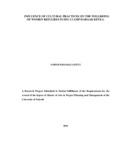| dc.description.abstract | This study set out to establish the influence of cultural practices on the wellbeing of
refugee women in Ifo 1 camp Dadaab Kenya. The objectives of the study was to examine
how Sexual Violence influences the wellbeing of women refugees; to determine how
Female Genital Mutilation influences the wellbeing of women refugees; to establish how
the age at marriage influences the wellbeing of women refugees; and to assess how use of
family planning methods influences the wellbeing of women refugees. The study was
conducted as a cross-sectional survey; target population was 36,128 women refugees in
Ifo 1 camp Dadaab, 100 women were identified as the sample size by use of formula,
n=N/1+N (e) 2
. Simple random sampling design was used, structured interviews to obtain
information and questionnaires as data collection tools. Data was then analyzed,
summarized and presented in form of frequency tables, percentages and proportions.
100% of respondents reported to have experienced or knew someone in the camp who
had experienced sexual violence. Sexual harassment was reported to be popular as a form
of sexual violence with majority of perpetrators being intimate partners or husbands.
Majority of women (M= 4.27; SD=1.299) had undergone or knew someone who
underwent through FGM in the camp, while excision, as a type of FGM was the most
popular. Women (M= 4.52; SD=0.1154) got married or knew someone in the camp who
got married before attaining age of 18 years, majority reported to have married
voluntarily. Most women were using or had used family planning methods. Majority of
women reported that sexual violence, FGM, Age they got married and women not using
family planning methods caused them either unwanted pregnancies, low self-esteem,
STIs, family breakages/instability, withdrawal behaviors, stigma and gynecological
complications. There was correlation between each of the independent variables of sexual
violence, FGM, age at marriage and use of family planning methods and wellbeing of
women refugees. The findings of the study can be used as baseline information especially
for Gender-Based Violence projects. The study will also inform UNHCR GBV protection
programmes in Dadaab refugee camp, for their Country Operations Planning (COP) and
for refugee set up worldwide. The study will provide knowledge which expounds on
other studies carried out by researchers on impact on health and education. The Kenyan
government, through the ministry of public service, youth and gender affairs will use the
research findings in strategic planning and will also inform gender-based programs. The
study recommends awareness creation and advocacy for more women and girls to pursue
education beyond primary level and also to have those that have never attended school,
get enrolled in school and agencies in camps to create employment opportunities. Sharing
of family burdens or responsibilities by both men and women, sensitization on harmful
cultural practices and their effects is necessary for change of mindset by communities, a
rights-based approach is recommended and more psychosocial support services will
ensure effective response to sexual violence, FGM, girls who are married before attaining
age of 18 years and use of family planning to reduce its impacts and help survivors cope
with the rampant effects. | en_US |



